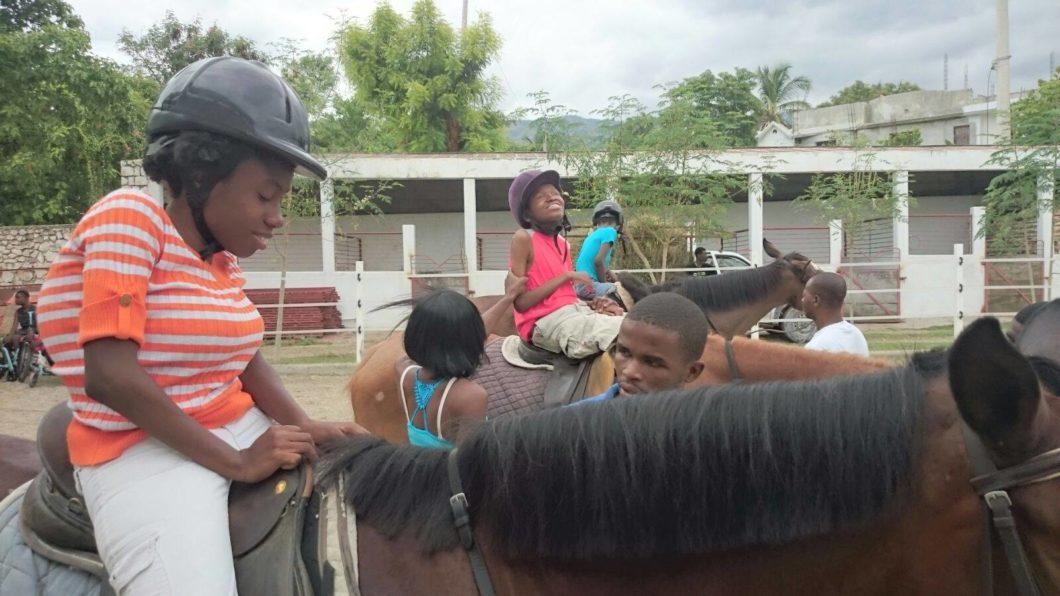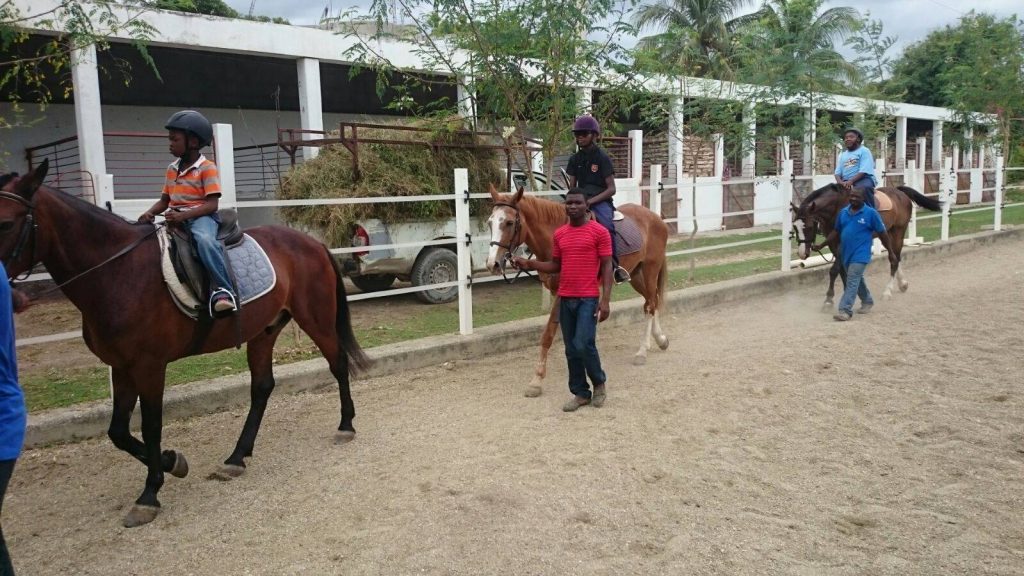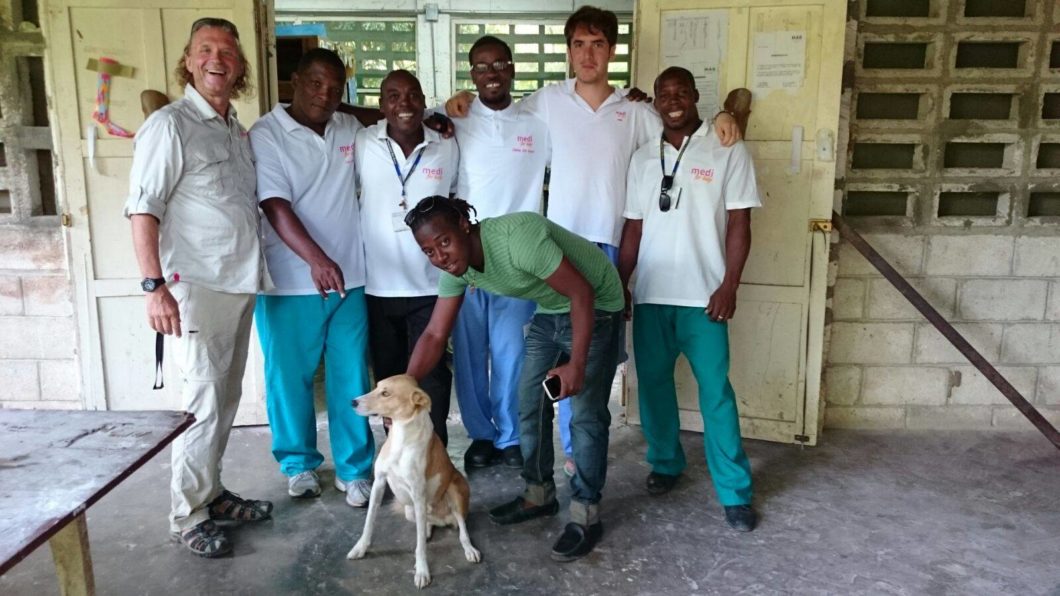
Workshop management passes to Haitian hands
Interview with Ralf Jungblut
The Bayreuth company medi inaugurated the relief project medi for help after the earthquake in Haiti in January 2010. The aim: to help the victims of the quake unbureaucratically on site and to provide lower limb prostheses for those in need. The spectrum of care these days also includes traumatological and orthopaedic cases. 6,250 patients have been cared for to date. In the interview, Ralf Jungblut, master CPO and manager of the medi for help workshop, reports on his experience and everyday life in Haiti.
Mr Jungblut, you have been in Haiti supporting medi for help for over two years now. What do you think is so special about this project?
“In my view, what makes it so special is the fact that medi for help has been supporting the Haitian population continuously since the earthquake in 2010. This is done through the provision of financial support and by the continuous engagement of European volunteers. 100% of the donations given are made available for the project on site”.
What challenges did you face during this time? And how were they solved?
“Time and time again, we had delays with the delivery of materials, so that our workflow ground to a halt and we had to improvise, in order to keep to the deadlines. When this happened, we simply made up a new prosthesis from several old ones. Patients who needed complicated prostheses, such as those with amputations of the upper limbs, presented another challenge, because medi does not supply any products for this. So we adapted components from children’s prostheses to make up upper arm prostheses. This worked very well and our patients are overjoyed at the result”.
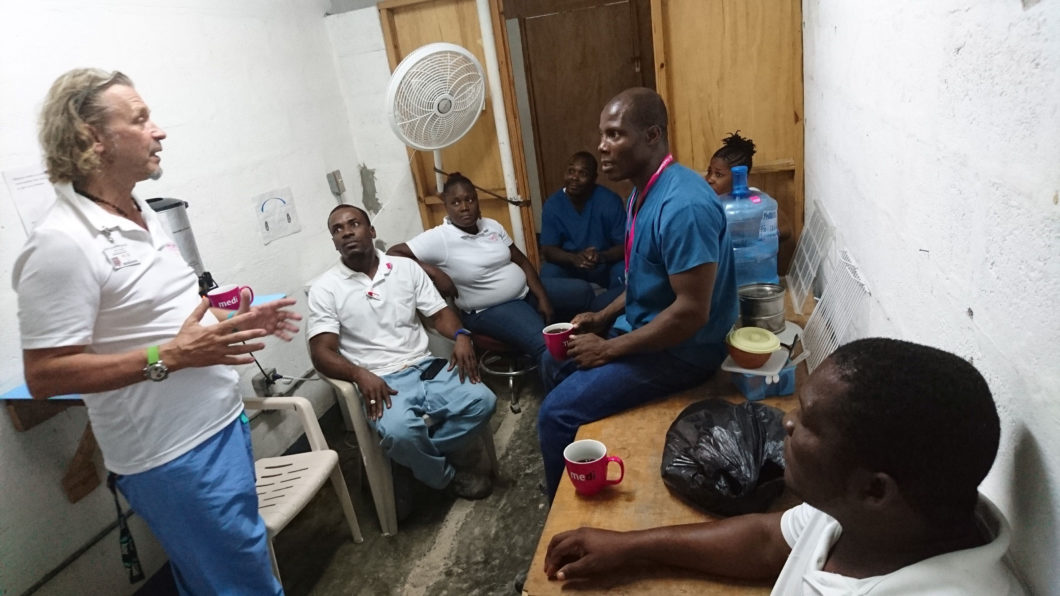
How did you find working together with the volunteers?
“The collaboration has been very good, because our volunteers to date have always brought with them an outstanding mixture of professional competence and social commitment. Above and beyond our day to day work with patients on site, we’ve had, to this day, regular, cordial contacts with all the staff – we are all practically friends. Many volunteers come back to Haiti and spend their time with the patients and the regular medi for help core team”.
Can you describe for us how you spend a typical working day in Haiti?
“Our workshop is affiliated with the Albert-Schweitzer-Hospital in Deschapelles. My working day there starts at seven o’clock in the morning with the “Morning Report”. The staff, i.e. doctors, physiotherapists, CPOs and volunteers, discuss what happened the day before and go through the new day’s plan of action. Difficult births, stabbings and road traffic accidents are regularly on the day’s agenda too.
The first patients arrive at the workshop at nine o’clock after having first consulted a doctor and collected their papers and prescriptions. Then we provide them with what they need. Some patients also stay at the hospital campus overnight or even up to a week, for example, while they are waiting for a prosthesis. This enables us to adapt the prosthesis and to practice walking with them.
We evaluate new patients and fill out the patients’ measurement charts. Then we prepare a plaster cast of their body. This takes anything up to an hour. Other patients come for regular service checkups. Our workshop is open until five o’clock on week days.
The CPOs, the future workshop manager Fabiola and I take it in turns to drive to the mobile clinics in Gonaïves, Saint-Marc or Mirebalais. These clinics do not have their own workshops and we care for the patients there in the field. You have to imagine that we have half a workshop in the car – from plaster dressings to tools”.
What is the general situation and the patient care situation in this country? What differences are there between the rural areas and the towns?
“The greatest challenge in Haiti is dealing with the rubbish. It lies around everywhere, because there is no organised rubbish disposal system. Organic waste and plastic rubbish are burnt in the open streets. So you breathe in the stench, bad air and volatile hydrocarbons. This causes the people to suffer from asthma and other airways diseases. The rubbish also bungs up the drains. This means that the next time it rains, the holes filled with water, mosquitoes spawn and a short while later the people are exposed to a mosquito invasion and a malaria epidemic.
The true patient care situation cannot be compared by any means to what we have in Europe. They do have a few hospitals there, most of which have been set up and are supported by foreign organisations. Many patients are miles away from a doctor or hospital, which is why many conditions are treated too late. In the rural areas, there aren’t any practice-based doctors. Very often the patients live in the mountains and are forced to travel many kilometres to the next hospital on foot, on mopeds or on a stretcher.
The Haitian doctors are trained in Haiti and have the chance to gain practical experience in the hospitals. Although important medicines are sometimes not available, the most common conditions can still be treated”.
What was the most emotional moment for you in Haiti and what do you remember in particular?
“There were so many wonderful, but also moving moments in Haiti. The death of the sister of our CPO Alix Paul hit me personally very hard. We often took her to the University Clinic in Mirebalais for treatment and I bought the special drugs for her in the capital city, but sadly Alix’s sister died of her illness.
In contrast, the last visit by my partner Iwona was wonderful, because the workshop team held a surprise Haitian party for us all. Our two girls Fabiola and Roseline did the cooking with their sisters’ help. So when Roseline thanked us in Creole and Fabiola in English, we were so moved that we got misty-eyed”!
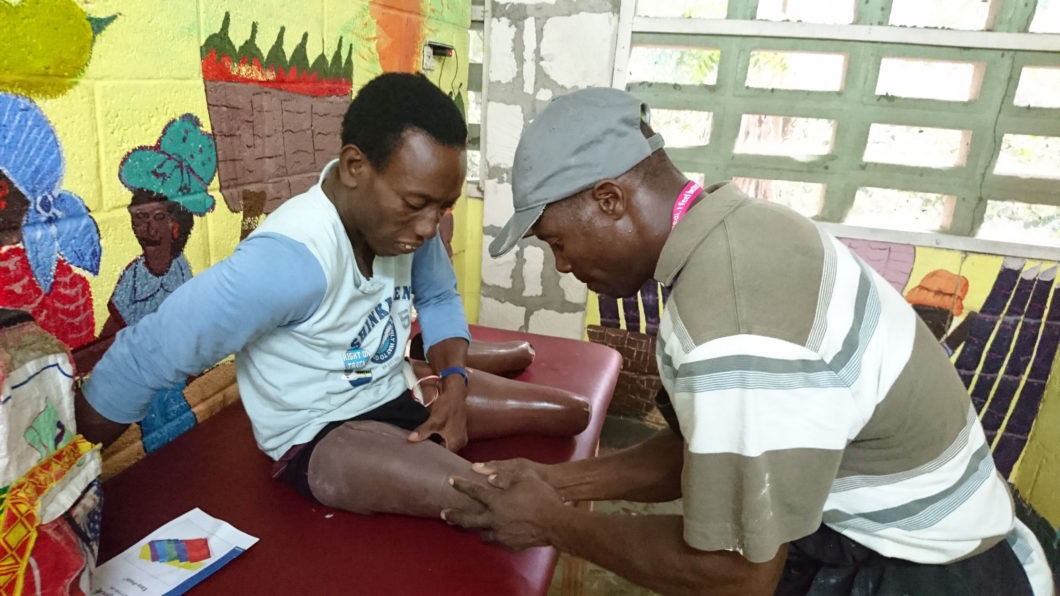
1,000 people in Haiti lost their lives during hurricane Matthew in October 2016. The hurricane also caused tremendous damage. What did you experience during this time?
“Because this tropical whirlwind swept over the island from the South West, we in Port au Prince and Deschapelles weren’t physically hit. Our team and the Albert-Schweitzer-Hospital wanted to help and deliver water to the affected areas, but sadly this couldn’t be done due to the damage caused to the roads. I also noticed that the market prices for fruit and vegetables were higher here for two weeks due to the hurricane”.
But did this natural disaster still affect the medi for help project?
“No, we didn’t notice any effects of the hurricane. The Albert-Schweitzer-Hospital had made preparations, but no patients from the affected region came to us for treatment”.
“We’re not giving up running the workshop, so that we can withdraw from the project, instead we’re doing all we can to help the Haitians help themselves in the long-term. This is only possible, if they shoulder the responsibility too – for the budget, the materials and caring for patients on a regular basis.”
Ralf Jungblut
The management of the workshop will pass into Haitian hands for the first time ever in 2017. What does this milestone mean for the project?
“This is really a fantastic chance for the whole team and the Albert-Schweitzer-Hospital. We’re not giving up running the workshop, so that we can withdraw from the project, rather we’re doing all we can to help the Haitians help themselves in the long-term. This is only possible, if they shoulder the responsibility too – for the budget, the materials and for caring for patients on a regular basis. With Fabiola, we will have a workshop manager and trained CPO, who will push forward ambitiously with our project”.
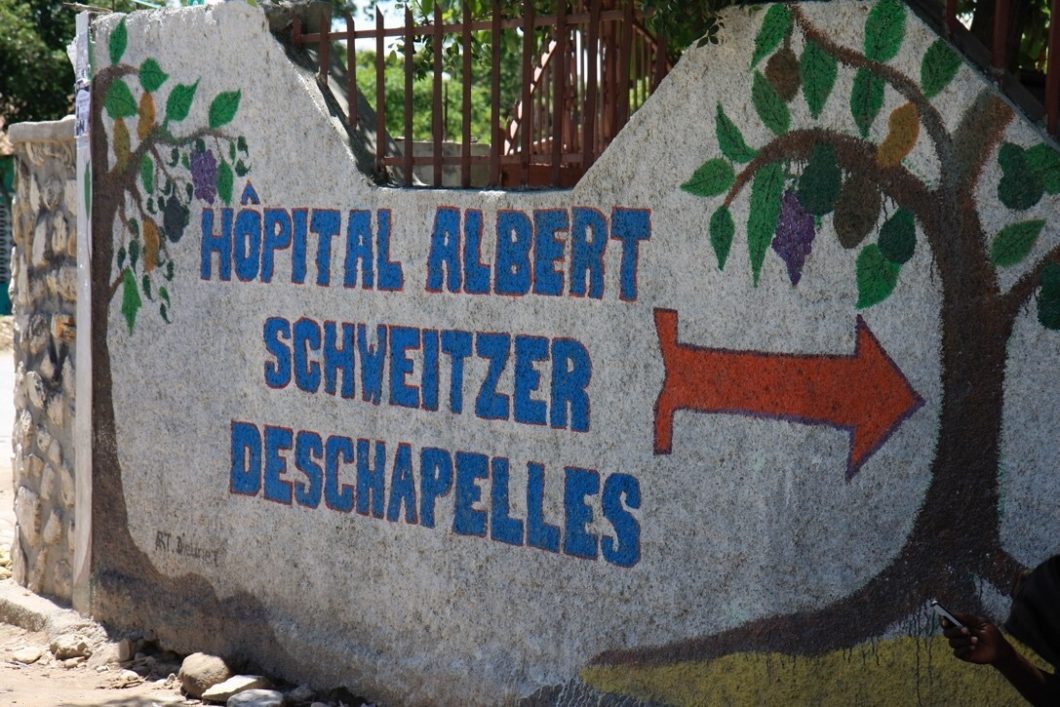
When you look back over your time in Haiti, what results are you particularly proud of?
“For example, I am proud that we established weekly, and thus regular, patient care in the three mobile clinics. I am also very happy that we have found Fabiola as a competent and dedicated successor to manage the workshop. The hippotherapy programme for handicapped children at Saint Vincent children’s Hospital in Port-au-Prince, which I personally helped to set up, is also one of the special events that I’m proud of. This program enables handicapped children to ride horses. The purpose of this treatment is to activate their zest for life, strengthen their self-confidence and help them train their sense of balance”.
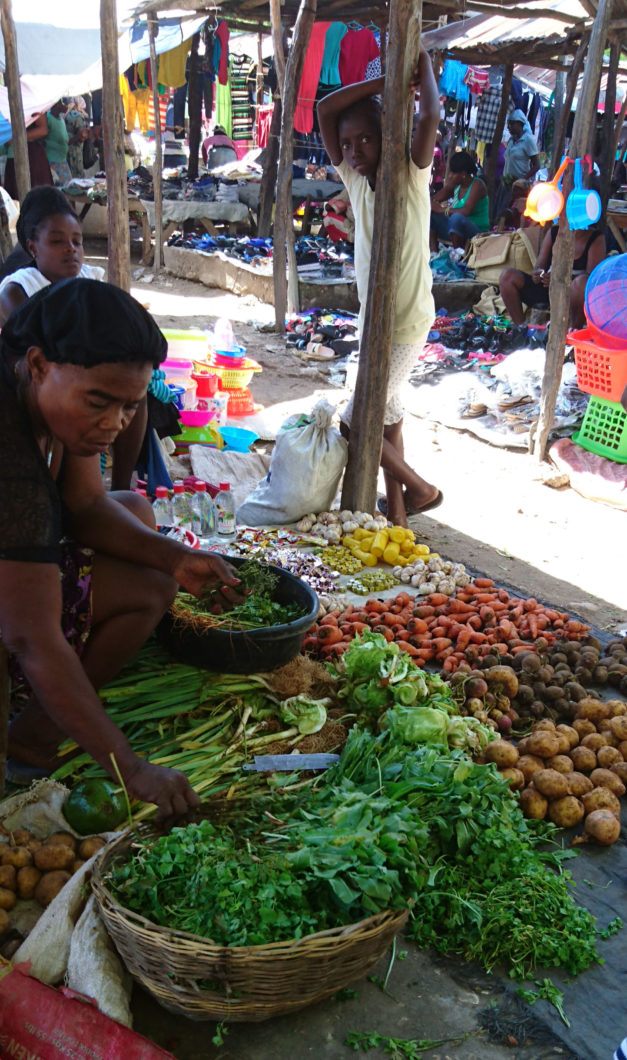
What do you particularly like about Haiti, the people, and life in this country?
“The hospitality and their joy of life, both of which they have in abundance despite many limitations and personal setbacks. The people don’t let these things get them down so easily, they are rarely in a bad mood and they solve many problems with a smile. This warmth is really infectious”.
What would you wish Haiti?
“I hope and wish that our project will remain successful and continue to develop once it has been handed over to the Haitians. For Haiti itself, I hope that the entire spectrum of the infrastructure will be improved, that they start solving the waste disposal problem and that they will battle against corruption. What’s more, the Haitians must learn to use their natural resources instead of importing everything at high prices. This starts with the dairy products, none of which are available fresh, not even at the market”.
Mr Jungblut, many thanks for the interview.
